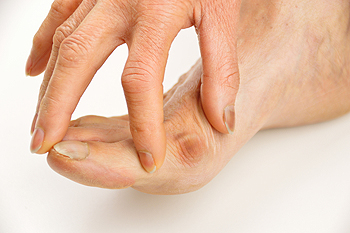 A common reason patients may develop bunions can be from the shoes that are frequently worn. Many shoes have inadequate room for the toes to move freely in, which may cause the bone on the side of the big toe to protrude. Additionally, research has indicated that genetics may play a significant role in the development of a bunion. The bunion may cause the shape of the foot to change, and larger shoes may have to be purchased. An existing bunion can cause the inability to bend or strengthen the big toe, and it may become red and swollen. If you are afflicted with a bunion, it is advised that you consult with a podiatrist who can offer the best treatment for you.
A common reason patients may develop bunions can be from the shoes that are frequently worn. Many shoes have inadequate room for the toes to move freely in, which may cause the bone on the side of the big toe to protrude. Additionally, research has indicated that genetics may play a significant role in the development of a bunion. The bunion may cause the shape of the foot to change, and larger shoes may have to be purchased. An existing bunion can cause the inability to bend or strengthen the big toe, and it may become red and swollen. If you are afflicted with a bunion, it is advised that you consult with a podiatrist who can offer the best treatment for you.
If you are suffering from bunions, contact one of our podiatrists of Summit Podiatry. Our doctors can provide the care you need to keep you pain-free and on your feet.
What Is a Bunion?
A bunion is formed of swollen tissue or an enlargement of boney growth, usually located at the base joint of the toe that connects to the foot. The swelling occurs due to the bones in the big toe shifting inward, which impacts the other toes of the foot. This causes the area around the base of the big toe to become inflamed and painful.
Why Do Bunions Form?
Genetics – Susceptibility to bunions are often hereditary
Stress on the feet – Poorly fitted and uncomfortable footwear that places stress on feet, such as heels, can worsen existing bunions
How Are Bunions Diagnosed?
Doctors often perform two tests – blood tests and x-rays – when trying to diagnose bunions, especially in the early stages of development. Blood tests help determine if the foot pain is being caused by something else, such as arthritis, while x-rays provide a clear picture of your bone structure to your doctor.
How Are Bunions Treated?
- Refrain from wearing heels or similar shoes that cause discomfort
- Select wider shoes that can provide more comfort and reduce pain
- Anti-inflammatory and pain management drugs
- Orthotics or foot inserts
- Surgery
If you have any questions, please feel free to contact one of our offices located in Wilmington, Whiteville, and Wallace, NC . We offer the newest diagnostic and treatment technologies for all your foot care needs.
